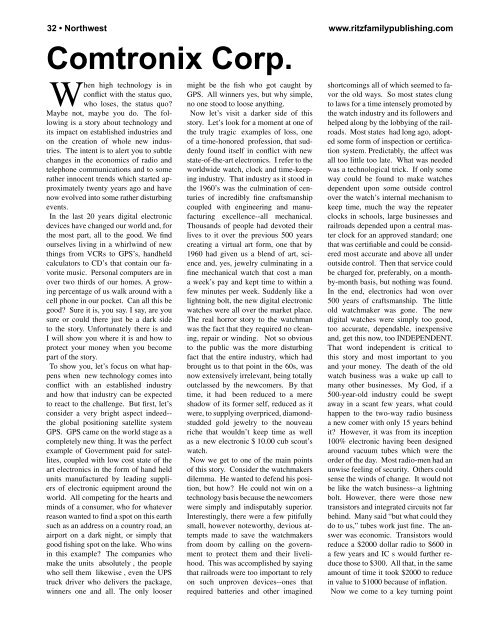Western Farm, Ranch & Dairy Magazine - Ritz Family Publishing, Inc.
Western Farm, Ranch & Dairy Magazine - Ritz Family Publishing, Inc.
Western Farm, Ranch & Dairy Magazine - Ritz Family Publishing, Inc.
You also want an ePaper? Increase the reach of your titles
YUMPU automatically turns print PDFs into web optimized ePapers that Google loves.
32 • Northwest www.ritzfamilypublishing.com<br />
Comtronix Corp.<br />
When high technology is in<br />
conflict with the status quo,<br />
who loses, the status quo?<br />
Maybe not, maybe you do. The following<br />
is a story about technology and<br />
its impact on established industries and<br />
on the creation of whole new industries.<br />
The intent is to alert you to subtle<br />
changes in the economics of radio and<br />
telephone communications and to some<br />
rather innocent trends which started approximately<br />
twenty years ago and have<br />
now evolved into some rather disturbing<br />
events.<br />
In the last 20 years digital electronic<br />
devices have changed our world and, for<br />
the most part, all to the good. We find<br />
ourselves living in a whirlwind of new<br />
things from VCRs to GPS’s, handheld<br />
calculators to CD’s that contain our favorite<br />
music. Personal computers are in<br />
over two thirds of our homes. A growing<br />
percentage of us walk around with a<br />
cell phone in our pocket. Can all this be<br />
good? Sure it is, you say. I say, are you<br />
sure or could there just be a dark side<br />
to the story. Unfortunately there is and<br />
I will show you where it is and how to<br />
protect your money when you become<br />
part of the story.<br />
To show you, let’s focus on what happens<br />
when new technology comes into<br />
conflict with an established industry<br />
and how that industry can be expected<br />
to react to the challenge. But first, let’s<br />
consider a very bright aspect indeed-the<br />
global positioning satellite system<br />
GPS. GPS came on the world stage as a<br />
completely new thing. It was the perfect<br />
example of Government paid for satellites,<br />
coupled with low cost state of the<br />
art electronics in the form of hand held<br />
units manufactured by leading suppliers<br />
of electronic equipment around the<br />
world. All competing for the hearts and<br />
minds of a consumer, who for whatever<br />
reason wanted to find a spot on this earth<br />
such as an address on a country road, an<br />
airport on a dark night, or simply that<br />
good fishing spot on the lake. Who wins<br />
in this example? The companies who<br />
make the units absolutely , the people<br />
who sell them likewise , even the UPS<br />
truck driver who delivers the package,<br />
winners one and all. The only looser<br />
might be the fish who got caught by<br />
GPS. All winners yes, but why simple,<br />
no one stood to loose anything.<br />
Now let’s visit a darker side of this<br />
story. Let’s look for a moment at one of<br />
the truly tragic examples of loss, one<br />
of a time-honored profession, that suddenly<br />
found itself in conflict with new<br />
state-of-the-art electronics. I refer to the<br />
worldwide watch, clock and time-keeping<br />
industry. That industry as it stood in<br />
the 1960’s was the culmination of centuries<br />
of incredibly fine craftsmanship<br />
coupled with engineering and manufacturing<br />
excellence--all mechanical.<br />
Thousands of people had devoted their<br />
lives to it over the previous 500 years<br />
creating a virtual art form, one that by<br />
1960 had given us a blend of art, science<br />
and, yes, jewelry culminating in a<br />
fine mechanical watch that cost a man<br />
a week’s pay and kept time to within a<br />
few minutes per week. Suddenly like a<br />
lightning bolt, the new digital electronic<br />
watches were all over the market place.<br />
The real horror story to the watchman<br />
was the fact that they required no cleaning,<br />
repair or winding. Not so obvious<br />
to the public was the more disturbing<br />
fact that the entire industry, which had<br />
brought us to that point in the 60s, was<br />
now extensively irrelevant, being totally<br />
outclassed by the newcomers. By that<br />
time, it had been reduced to a mere<br />
shadow of its former self, reduced as it<br />
were, to supplying overpriced, diamondstudded<br />
gold jewelry to the nouveau<br />
riche that wouldn’t keep time as well<br />
as a new electronic $ 10.00 cub scout’s<br />
watch.<br />
Now we get to one of the main points<br />
of this story. Consider the watchmakers<br />
dilemma. He wanted to defend his position,<br />
but how? He could not win on a<br />
technology basis because the newcomers<br />
were simply and indisputably superior.<br />
Interestingly, there were a few pitifully<br />
small, however noteworthy, devious attempts<br />
made to save the watchmakers<br />
from doom by calling on the government<br />
to protect them and their livelihood.<br />
This was accomplished by saying<br />
that railroads were too important to rely<br />
on such unproven devices--ones that<br />
required batteries and other imagined<br />
shortcomings all of which seemed to favor<br />
the old ways. So most states clung<br />
to laws for a time intensely promoted by<br />
the watch industry and its followers and<br />
helped along by the lobbying of the railroads.<br />
Most states had long ago, adopted<br />
some form of inspection or certification<br />
system. Predictably, the affect was<br />
all too little too late. What was needed<br />
was a technological trick. If only some<br />
way could be found to make watches<br />
dependent upon some outside control<br />
over the watch’s internal mechanism to<br />
keep time, much the way the repeater<br />
clocks in schools, large businesses and<br />
railroads depended upon a central master<br />
clock for an approved standard; one<br />
that was certifiable and could be considered<br />
most accurate and above all under<br />
outside control. Then that service could<br />
be charged for, preferably, on a monthby-month<br />
basis, but nothing was found.<br />
In the end, electronics had won over<br />
500 years of craftsmanship. The little<br />
old watchmaker was gone. The new<br />
digital watches were simply too good,<br />
too accurate, dependable, inexpensive<br />
and, get this now, too INDEPENDENT.<br />
That word independent is critical to<br />
this story and most important to you<br />
and your money. The death of the old<br />
watch business was a wake up call to<br />
many other businesses. My God, if a<br />
500-year-old industry could be swept<br />
away in a scant few years, what could<br />
happen to the two-way radio business<br />
a new comer with only 15 years behind<br />
it? However, it was from its inception<br />
100% electronic having been designed<br />
around vacuum tubes which were the<br />
order of the day. Most radio-men had an<br />
unwise feeling of security. Others could<br />
sense the winds of change. It would not<br />
be like the watch business--a lightning<br />
bolt. However, there were those new<br />
transistors and integrated circuits not far<br />
behind. Many said “but what could they<br />
do to us,” tubes work just fine. The answer<br />
was economic. Transistors would<br />
reduce a $2000 dollar radio to $600 in<br />
a few years and IC s would further reduce<br />
those to $300. All that, in the same<br />
amount of time it took $2000 to reduce<br />
in value to $1000 because of inflation.<br />
Now we come to a key turning point

















